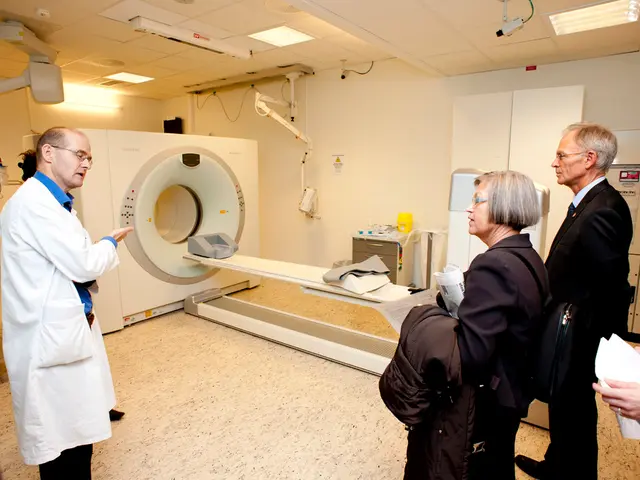"We've got to shore things up here" - Klingbeil promises health insurers a financial boost courtesy of tax revenues
Klingbeil unveils plans to inject funds into health insurance tax system
After the SOS signal from the new health minister, Finance Minister Lars Klingbeil has promised support to the struggling health and care insurance funds from the federal budget. However, he made it crystal clear that the gaps can't be permanently filled with tax dough. The exact amount of the subsidy remains a secret.
In an interview with the German Press Agency (dpa), Finance Minister Lars Klingbeil announced that he shall implement "fundamental and fearless" structural changes to the social security systems. He will kick things off by propping up the ailing health and care insurance funds with money from the federal budget. "We recognize there's a tricky situation in the health and care insurance systems and we need to stabilize here," the SPD leader told dpa. However, he cautioned, "We can't permanently solve the issues by merely chucking more tax money at them."
Coalition politics are in motion, with Vice Chancellor Lars Klingbeil referring to the agreement in the coalition agreement, which stipulates that the black-red coalition will team up with experts to formulate "fundamental and fearless structural reforms." Previously, Federal Health Minister Nina Warken had requested billions for both insurance systems to make their financial plight less grim and put a brake on further contribution rate hikes. Both insurance branches are drowning in red ink.
Health Minister Warken reminded the federal government of the substantial debts it owes to both health and care insurance funds. Part of it comes from uncollected contributions from citizens' allowance recipients and non-insurance-related services from the corona period. She pegged the shortfall for citizens' allowance recipients at ten billion euros and the federal corona debts at a whopping almost six billion euros. Klingbeil sidestepped her argument and kept mum about the promised federal subsidy's size to dpa.
Klingbeil asserted that ordinary working folks deserve to be confident in a robust social security system. "So instead of demanding that people work longer or slice services in the health system, let's think outside the box a bit," he said. Klingbeil also backed the initiative by the social democratic labor minister, Barbara Bas, to integrate civil servants into the statutory pension insurance. "Personally, I'm also open to debating who's paying into the pension pot and how much," the minister emphasized. The Chancellery had already shot down the proposal, arguing that it's not in the coalition agreement.
- The ongoing discussion in politics involves implementing fundamental changes to social security systems, with a particular focus on social security, health insurance, and social security, as suggested by Finance Minister Lars Klingbeil.
- In response to the struggling health and care insurance funds, Lars Klingbeil has proposed infusing them with funds from the federal budget as part of the structural reforms, aiming to stabilize their financial standing.
- The Finance Minister has also expressed support for the integration of civil servants into the statutory pension insurance, a proposal by the social democratic labor minister, Barbara Bas, and is open to debates about the contributors and contributions to the pension pot, though the Chancellery has previously rejected this idea.








